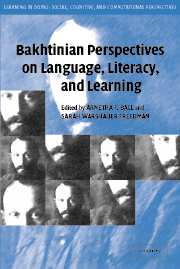Book contents
- Frontmatter
- Contents
- List of Contributors
- Acknowledgments
- PART I IDEOLOGIES IN DIALOGUE: THEORETICAL CONSIDERATIONS
- 1 Ideological Becoming: Bakhtinian Concepts to Guide the Study of Language, Literacy, and Learning
- 2 Dewey and Bakhtin in Dialogue: From Rosenblatt to a Pedagogy of Literature as Social, Aesthetic Practice
- 3 Intertextualities: Volosinov, Bakhtin, Literary Theory, and Literacy Studies
- 4 The Teaching of Academic Language to Minority Second Language Learners
- Voices in Dialogue – Dialoguing About Dialogism: Form and Content in a Bakhtinian Dialogue
- PART II VOICED, DOUBLE VOICED, AND MULTIVOICED DISCOURSES IN OUR SCHOOLS
- PART III HETEROGLOSSIA IN A CHANGING WORLD
- PART IV A CLOSING THOUGHT ON BAKHTINIAN PERSPECTIVES
- Author Index
- Subject Index
- Titles in the series
- References
1 - Ideological Becoming: Bakhtinian Concepts to Guide the Study of Language, Literacy, and Learning
Published online by Cambridge University Press: 24 May 2010
- Frontmatter
- Contents
- List of Contributors
- Acknowledgments
- PART I IDEOLOGIES IN DIALOGUE: THEORETICAL CONSIDERATIONS
- 1 Ideological Becoming: Bakhtinian Concepts to Guide the Study of Language, Literacy, and Learning
- 2 Dewey and Bakhtin in Dialogue: From Rosenblatt to a Pedagogy of Literature as Social, Aesthetic Practice
- 3 Intertextualities: Volosinov, Bakhtin, Literary Theory, and Literacy Studies
- 4 The Teaching of Academic Language to Minority Second Language Learners
- Voices in Dialogue – Dialoguing About Dialogism: Form and Content in a Bakhtinian Dialogue
- PART II VOICED, DOUBLE VOICED, AND MULTIVOICED DISCOURSES IN OUR SCHOOLS
- PART III HETEROGLOSSIA IN A CHANGING WORLD
- PART IV A CLOSING THOUGHT ON BAKHTINIAN PERSPECTIVES
- Author Index
- Subject Index
- Titles in the series
- References
Summary
In his recent exhibit, “Migrations,” photographer Sebastiao Salgado (2000) looks through his camera's eye to tell what he calls “a story of our times,” a story of massive and global movements of people. Most often these people are migrating because they seek refuge from rural poverty, or because they are refugees or displaced persons whose movements are caused by war or other political, ethnic, or religious conflict. Salgado presents haunting images of outstretched hands reaching for a new life that is just out of grasp, hungry children in parched landscapes that yield no food, masses on the move with nowhere to go. These images come from Asia, Africa, Europe, and the Americas. These are not the typical media images of globalization, which associate modernity with progress and prosperity, new technologies, and high-speed travel. We acknowledge the typical modern images, but we also think it critical not to forget Salgado's more disturbing images, which are also images of our times.
Salgado could just as easily have fixed his lens on disturbing scenes in the United States: the hungry and homeless who migrate from shelter to street in search of spare change or a bite to eat, undernourished school children moving from home to school on unsafe streets, gangs of teenagers crossing neighborhood boundaries to mark territory and engage in seemingly senseless battles. In everyday life, these scenes occur in the context of great wealth and plenty that often exists right around the corner.
Information
- Type
- Chapter
- Information
- Publisher: Cambridge University PressPrint publication year: 2004
References
Accessibility standard: Unknown
Why this information is here
This section outlines the accessibility features of this content - including support for screen readers, full keyboard navigation and high-contrast display options. This may not be relevant for you.Accessibility Information
- 74
- Cited by
